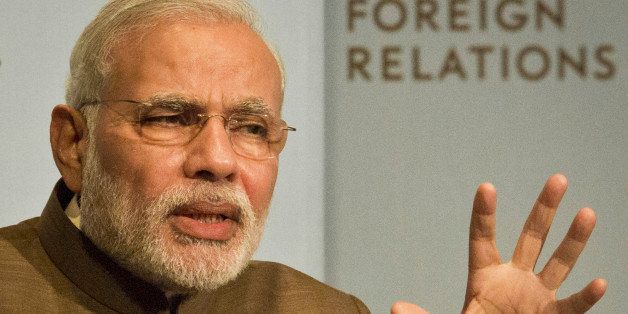Kathleen Miles is the executive editor and cofounder of Noema Magazine. She can be reached on Twitter at @mileskathleen.
NEW YORK — Indian Prime Minister Narendra Modi said Monday that the U.S. should not withdraw its troops from Afghanistan as quickly as it did from Iraq, where extremist group Islamic State, or ISIS, has since gained territory.
“We requested to America, regarding the defense withdrawal subject — please do not repeat the mistake that you did in Iraq,” Modi said during a discussion at the think tank the Council on Foreign Relations.
“Because after withdrawal from Iraq, you know what happened there. So the withdrawal process from Afghanistan should be very slow, and only then can we stop the Taliban from emerging its head.”
A senior adviser to President Barack Obama said Monday that Afghanistan will sign a deal Tuesday to allow about 10,000 American troops to stay in the country after the international combat mission ends on Dec. 31. The announcement comes after Ashraf Ghani Ahmadzai was sworn in Monday as Afghanistan’s new president. The same day, extremist violence killed at least 12 civilians and police officers in the country.
India is home to the world’s second-largest Muslim population, behind Indonesia. When Modi was asked if he is concerned that ISIS or other Muslim extremism could spread to India, he dismissed the possibility.
“As far as India is concerned, no matter which community or village a person belongs to, there is a basic philosophy which drives everyone. It is symbolized by Buddha, Mahatma Gandhi. We believe in nonviolence,” Modi said. “That’s in our very nature.”
He said Indians are very concerned by terrorism that is has been exported to India. “It’s not homegrown,” he said. “The Muslim in India … will fail al Qaeda.”
In a 55-minute video released earlier this month, the current leader of al Qaeda promised to “raise the flag of jihad” in India. India issued a security alert in several states after the announcement. Al Qaeda reportedly has no presence on the ground in India, but may be trying to reach disaffected Muslim youth, especially in Kashmir and Gujarat.
Modi, visiting the U.S. for the first time since he took office, will meet with Obama for a private White House dinner Monday night. On Tuesday, they will hold a summit aimed at strengthening U.S.-Indian relations.
Prior to this trip, Modi was a denied a U.S. visa for about a decade following the religious riots in 2002 that killed more than 1,000 Muslims in the state of Gujarat, where he was the top official. Modi has denied involvement in the violence, and India’s Supreme Court has said there was no case against him. However, the day before Modi’s arrival in New York, a U.S. federal court issued a summons for him to respond to a lawsuit that accuses him of human rights abuses in connection with the riots. Modi has not responded, and it’s unlikely the lawsuit will affect his visit.
On Sunday, a whopping 19,000 cheering fans came to see Modi deliver a speech in Madison Square Garden in New York City.





